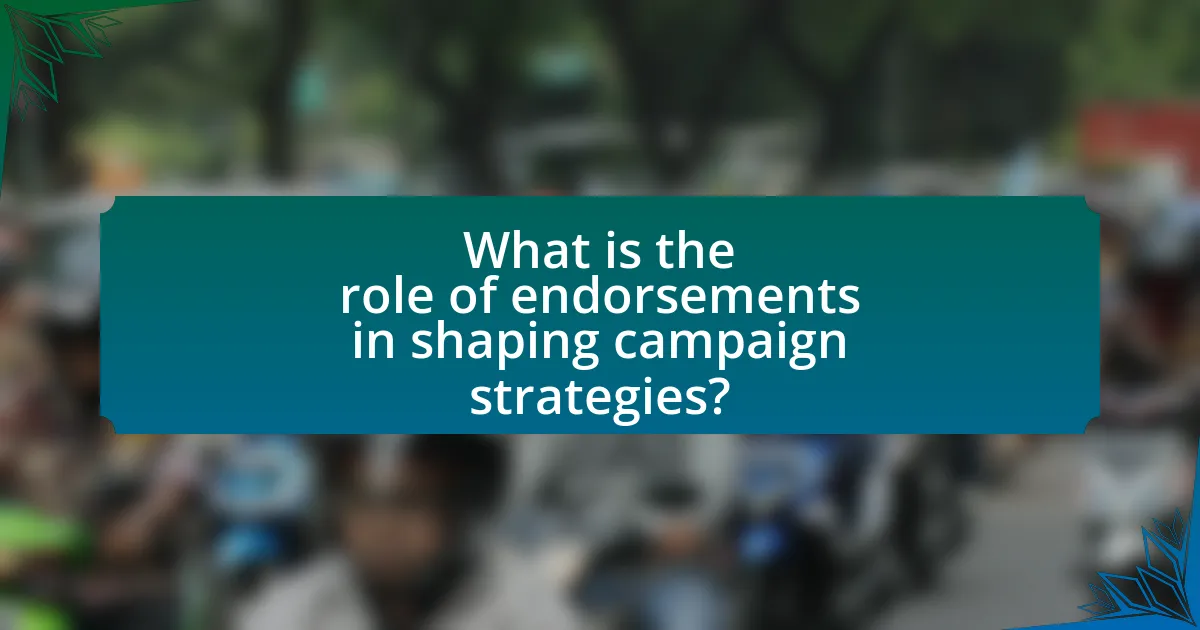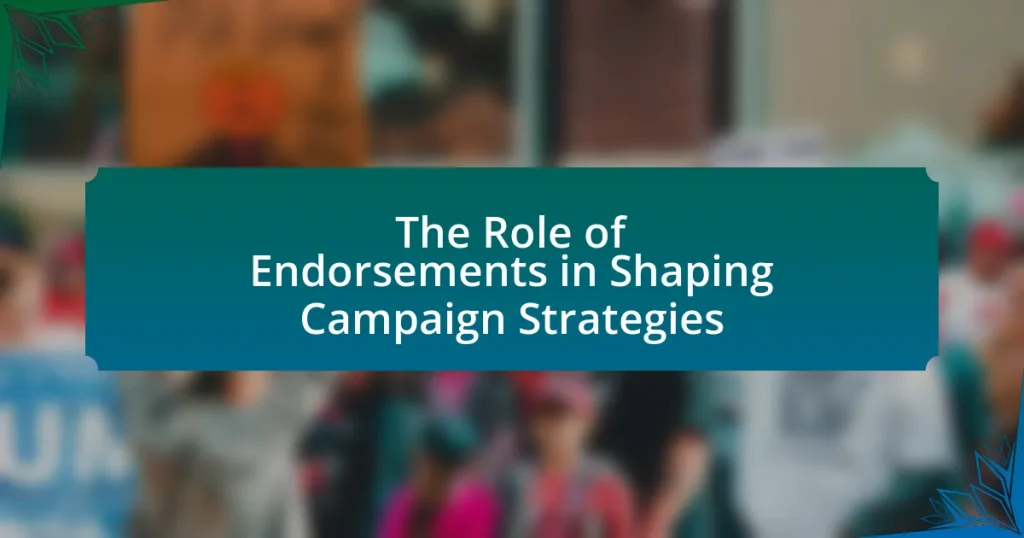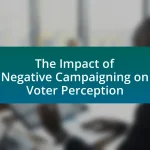The article examines the critical role of endorsements in shaping campaign strategies within political contexts. It highlights how endorsements enhance a candidate’s credibility, influence voter perceptions, and guide campaign messaging. Key factors such as psychological influences, types of endorsements, and their impact on trust, fundraising, and candidate branding are discussed. Additionally, the article addresses the potential risks associated with endorsements and outlines best practices for campaigns to effectively leverage endorsements for maximum impact while mitigating negative consequences.

What is the role of endorsements in shaping campaign strategies?
Endorsements play a crucial role in shaping campaign strategies by enhancing credibility and influencing voter perceptions. When a candidate receives endorsements from respected figures or organizations, it signals to voters that the candidate is trustworthy and has the support of influential leaders. For instance, endorsements from prominent political figures can significantly boost a candidate’s visibility and appeal, as seen in the 2008 U.S. presidential election when Barack Obama received endorsements from key figures like Ted Kennedy, which helped solidify his position among Democratic voters. Additionally, endorsements can guide campaign messaging and strategy, as candidates often align their platforms with the values and priorities of their endorsers to attract their supporters. This strategic alignment can lead to increased fundraising and volunteer support, ultimately impacting the overall success of the campaign.
How do endorsements influence voter perception?
Endorsements significantly influence voter perception by enhancing the credibility and appeal of a candidate. When a respected individual or organization endorses a candidate, it can lead to increased trust and a positive association in the minds of voters. Research indicates that endorsements can sway undecided voters, as they often rely on the opinions of trusted figures to make informed decisions. For instance, a study by the Pew Research Center found that 70% of voters consider endorsements from local leaders as influential in their voting choices. This demonstrates that endorsements not only validate a candidate’s qualifications but also shape the overall narrative of the campaign, ultimately impacting voter behavior and election outcomes.
What psychological factors make endorsements effective?
Endorsements are effective due to several psychological factors, including credibility, social proof, and emotional appeal. Credibility arises when the endorser is perceived as trustworthy and knowledgeable, which enhances the persuasive power of the endorsement. For instance, a study by Ohanian (1990) found that the perceived expertise and trustworthiness of a celebrity endorser significantly influenced consumer attitudes and purchase intentions.
Social proof plays a crucial role as individuals often look to others for guidance in their decision-making, especially in uncertain situations. When a respected figure endorses a product or candidate, it signals to potential supporters that the choice is valid and widely accepted. This phenomenon is supported by Cialdini’s principles of influence, which highlight how people are influenced by the actions and endorsements of others.
Emotional appeal is another key factor, as endorsements can evoke feelings that resonate with the audience, creating a connection that drives engagement and loyalty. Research indicates that emotional responses can significantly impact decision-making processes, making endorsements that tap into these emotions more effective.
Together, these psychological factors—credibility, social proof, and emotional appeal—create a compelling framework that enhances the effectiveness of endorsements in shaping campaign strategies.
How do endorsements affect trust in candidates?
Endorsements significantly enhance trust in candidates by leveraging the credibility of the endorsing individuals or organizations. When a respected figure or institution publicly supports a candidate, it signals to voters that the candidate is trustworthy and competent, as seen in studies showing that endorsements can increase a candidate’s perceived legitimacy. For instance, a 2016 study by the Pew Research Center found that 70% of voters are influenced by endorsements from trusted figures, indicating a direct correlation between endorsements and increased voter confidence in candidates.
What types of endorsements exist in political campaigns?
In political campaigns, there are several types of endorsements, including individual endorsements, organizational endorsements, and media endorsements. Individual endorsements come from prominent figures, such as politicians, celebrities, or community leaders, who lend their personal support to a candidate. Organizational endorsements are provided by groups, such as labor unions, political parties, or advocacy organizations, which often represent a collective interest or constituency. Media endorsements occur when news outlets or publications publicly support a candidate, influencing public perception and voter behavior. These endorsements can significantly impact a candidate’s credibility and voter appeal, as evidenced by studies showing that endorsements can sway undecided voters and enhance a candidate’s visibility in the electoral process.
How do celebrity endorsements differ from political endorsements?
Celebrity endorsements primarily promote products or brands, while political endorsements support candidates or political parties. The former leverages the celebrity’s influence to drive consumer behavior, often focusing on lifestyle and aspirational messaging. In contrast, political endorsements aim to sway public opinion and voter behavior, emphasizing policy positions and ideological alignment. For instance, a study by the Pew Research Center found that endorsements from celebrities can significantly impact consumer choices, whereas political endorsements are more effective in mobilizing voter turnout, as evidenced by the 2008 presidential election where endorsements from figures like Oprah Winfrey were credited with influencing voter engagement.
What role do grassroots endorsements play in local campaigns?
Grassroots endorsements play a crucial role in local campaigns by enhancing candidate credibility and mobilizing community support. These endorsements often come from local organizations, community leaders, or influential activists who resonate with the electorate, thereby increasing voter trust and engagement. Research indicates that candidates receiving grassroots endorsements can experience a significant boost in voter turnout, as these endorsements often reflect the values and concerns of the community. For instance, a study by the Pew Research Center found that local endorsements can sway undecided voters, making them more likely to support candidates who align with their community’s interests.
Why are endorsements critical in campaign strategy development?
Endorsements are critical in campaign strategy development because they enhance credibility and influence voter perception. When a respected individual or organization publicly supports a candidate, it signals to voters that the candidate is trustworthy and has the backing of established figures, which can significantly sway undecided voters. For instance, endorsements from influential political figures or organizations can lead to increased media coverage and public interest, as seen in the 2008 presidential campaign when Barack Obama received endorsements from prominent figures like Ted Kennedy, which helped solidify his position as a leading candidate. This demonstrates that endorsements not only validate a candidate’s platform but also amplify their reach and effectiveness in engaging with the electorate.
How do endorsements help in building a candidate’s brand?
Endorsements significantly enhance a candidate’s brand by providing credibility and expanding their reach. When a respected figure or organization endorses a candidate, it signals to voters that the candidate is trustworthy and has the support of influential individuals or groups. For example, endorsements from prominent political figures or well-known organizations can lead to increased media coverage and public interest, which can translate into higher voter engagement. According to a study by the Pew Research Center, candidates who receive endorsements from well-regarded individuals tend to see a measurable increase in their polling numbers, demonstrating the tangible impact endorsements can have on a candidate’s brand perception and overall campaign success.
What impact do endorsements have on fundraising efforts?
Endorsements significantly enhance fundraising efforts by increasing credibility and attracting donor interest. When a well-respected individual or organization endorses a campaign, it often leads to a surge in donations, as supporters are more likely to contribute to a candidate or cause that has gained validation from trusted figures. For instance, a study by the Pew Research Center found that candidates who received endorsements from prominent political figures raised, on average, 30% more funds than those without endorsements. This demonstrates that endorsements not only boost financial contributions but also amplify the overall visibility and appeal of a campaign.
How do endorsements transition into actionable campaign strategies?
Endorsements transition into actionable campaign strategies by leveraging the credibility and influence of the endorser to shape public perception and mobilize voter support. When a prominent figure endorses a candidate, it often leads to increased media coverage and public interest, which can be strategically utilized to enhance campaign messaging. For instance, endorsements from respected community leaders can validate a candidate’s platform, making it more appealing to undecided voters. Additionally, campaigns can incorporate the endorser’s network to expand outreach efforts, utilizing their connections for fundraising and grassroots mobilization. This approach is supported by research indicating that candidates with high-profile endorsements tend to experience a measurable boost in polling numbers, demonstrating the effectiveness of endorsements in translating into actionable strategies.
What are the potential risks associated with endorsements?
The potential risks associated with endorsements include damage to credibility, misalignment with audience values, and backlash from negative associations. When a public figure endorses a product or candidate, their reputation is on the line; if the endorsed entity faces controversy, it can reflect poorly on the endorser. For example, in 2016, several celebrities faced criticism for endorsing political candidates who later became embroiled in scandals, leading to public disapproval of the endorsers. Additionally, if the endorsed product or candidate does not resonate with the audience’s values, it can alienate supporters, as seen when brands that misjudge consumer sentiment face boycotts. Lastly, endorsements can lead to backlash if the endorser is perceived as inauthentic or opportunistic, which can diminish their influence and trustworthiness.
What best practices should campaigns follow when seeking endorsements?
Campaigns should prioritize building genuine relationships with potential endorsers to effectively seek endorsements. Establishing trust and demonstrating shared values can significantly enhance the likelihood of receiving support. Research indicates that endorsements from credible figures can increase a candidate’s perceived legitimacy and appeal, as seen in the 2016 U.S. presidential election where endorsements from influential leaders played a crucial role in voter perception. Additionally, campaigns should tailor their outreach strategies to align with the interests and priorities of the endorsers, ensuring that the endorsement feels authentic and mutually beneficial.
How can campaigns effectively leverage endorsements for maximum impact?
Campaigns can effectively leverage endorsements for maximum impact by strategically selecting endorsers who align with their target audience and values. This alignment enhances credibility and trust, as seen in the 2020 U.S. presidential election, where endorsements from influential figures like Barack Obama significantly boosted Joe Biden’s appeal among younger voters. Additionally, campaigns should utilize multi-channel communication to disseminate endorsements, ensuring they reach a broad audience through social media, traditional media, and events. Research indicates that endorsements can increase voter turnout by up to 10%, demonstrating their potential to mobilize supporters effectively.
What strategies can mitigate the risks of negative endorsements?
To mitigate the risks of negative endorsements, campaigns should focus on proactive reputation management, strategic communication, and building strong relationships with key stakeholders. Proactive reputation management involves monitoring public perception and addressing potential issues before they escalate, as demonstrated by companies that utilize social listening tools to gauge sentiment and respond promptly. Strategic communication includes crafting clear, positive narratives that highlight the campaign’s strengths and counteract negative messages, supported by research indicating that consistent messaging can significantly influence public opinion. Additionally, building strong relationships with influencers and community leaders can create a buffer against negative endorsements, as studies show that endorsements from trusted figures can enhance credibility and diminish the impact of adverse opinions.


